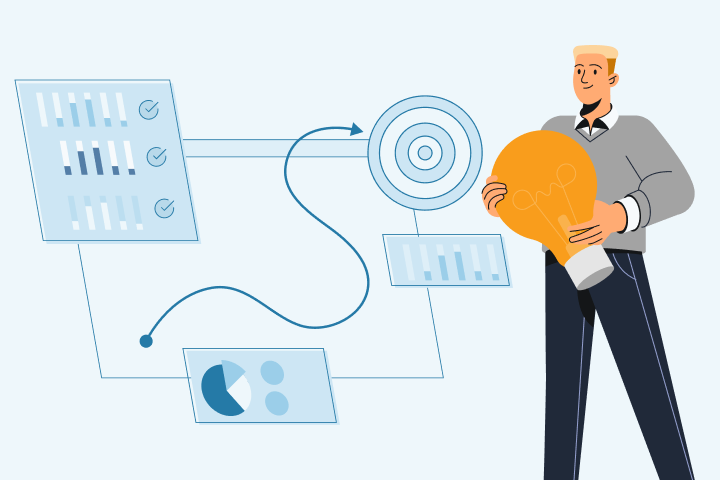Build an Employee Advocacy Strategy That Drives Results
Employee advocacy is a powerful organic marketing tactic to amplify brand messages. It's cost effective, produces relatively quick results, and is fairly easy to implement.
However, the main challenge with this strategy is keeping employees engaged for more than a few weeks.
In this post, we’ll discuss what an employee advocacy strategy is, and then provide a proven strategy with step-by-step instructions that makes engagement easy and fun for employees.
What Is an Employee Advocacy Strategy?
An employee advocacy strategy is a content promotion technique where employees engage with and share branded messages with their professional networks to increase organic impressions and reach more potential customers.
It’s primarily used for promoting social media posts published by the brand or key executive leaders, though employees can also create their own posts promoting brand messages. The reach quality also tends to be higher than paid promotion because your employees share it with a warm audience (their connections).
Employee advocacy is an excellent method for increasing brand awareness, and many sales professionals use it as a social selling tool.
Employee Advocacy Example
Archer Aviation has an active employee advocacy program, and this post is just one excellent example of employee advocacy in action.
You’ll see that the brand published a LinkedIn post promoting a news announcement:
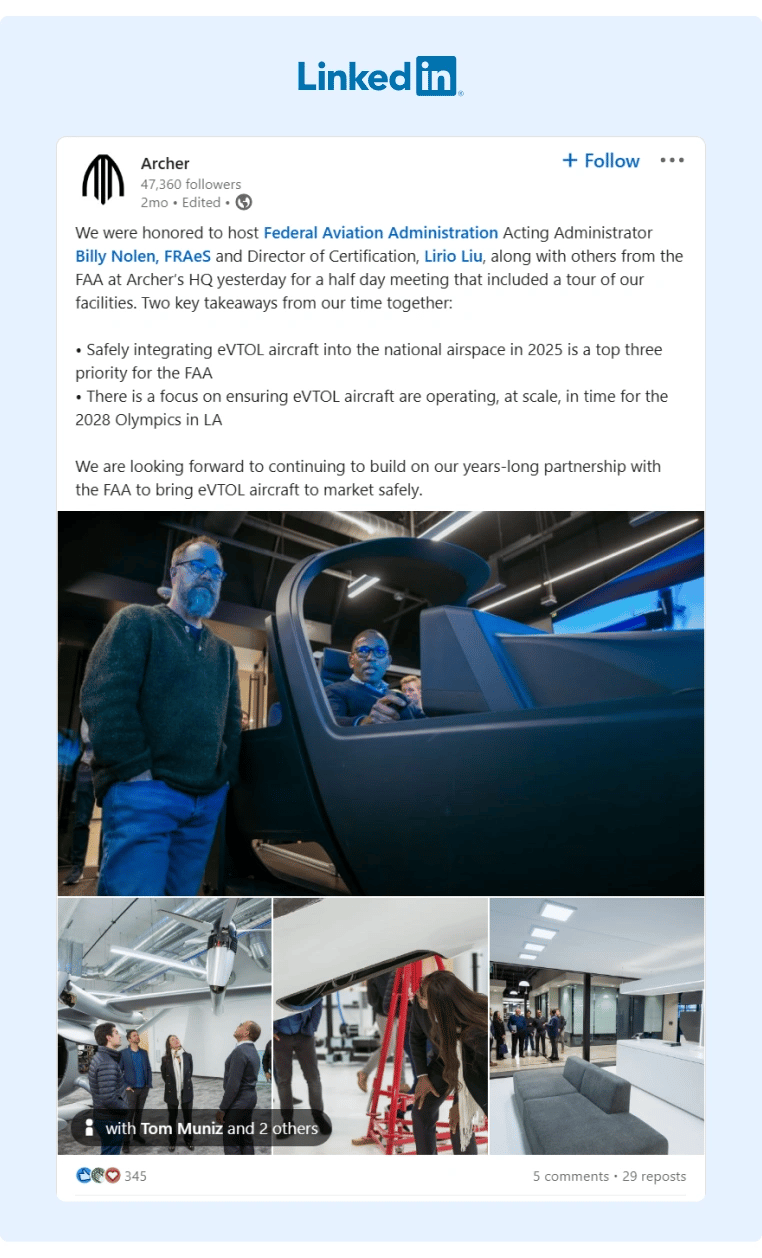
Source: Archer
Then, many of the employees jumped in and shared it with their networks:
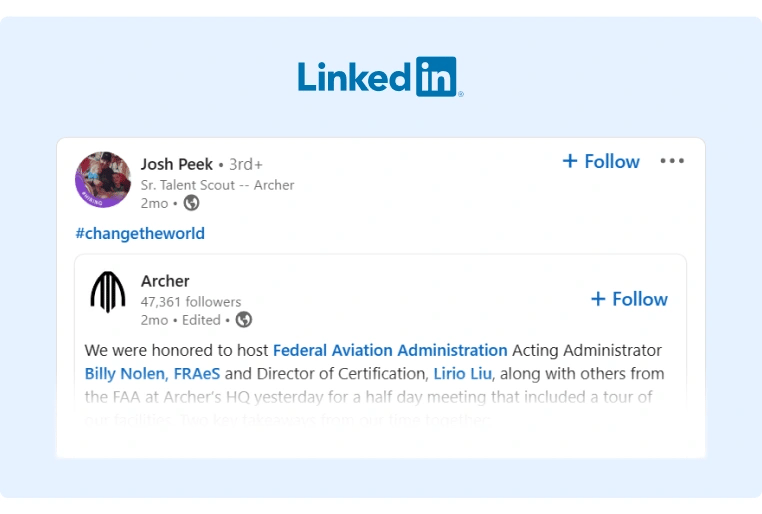
Source: Josh Peek
When employees share content with their networks, it helps the brand earn impressions from a warm audience (your employees’ networks). It also signals to social media algorithms that the content is high quality and deserves more organic reach.
In addition to sharing branded content, employees can also post their own content promoting the brand.
The post below is an excellent example of this style of employee advocacy. The CMO created his own post about the company culture:
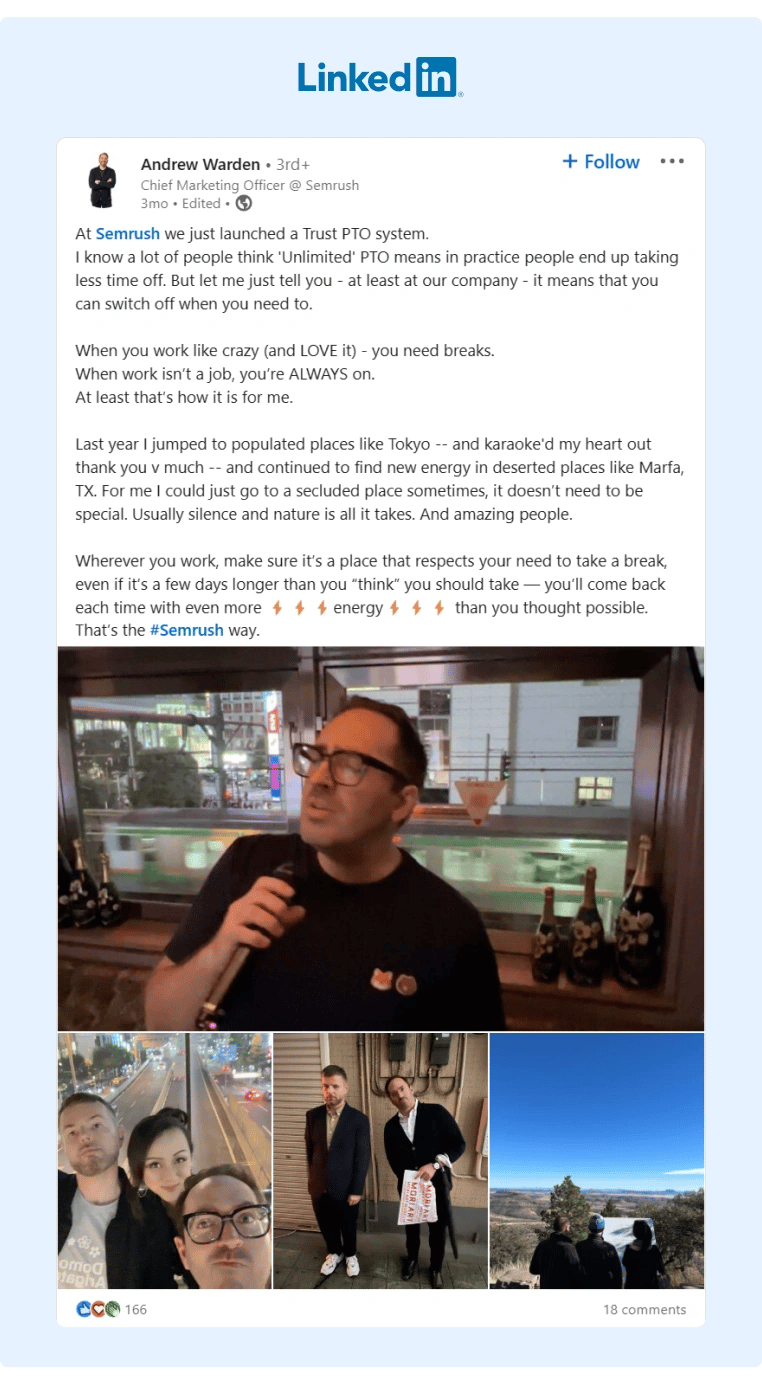
Source: Andrew Warden
Then, you’ll see in the comments that it produced a lot of interest in the company:
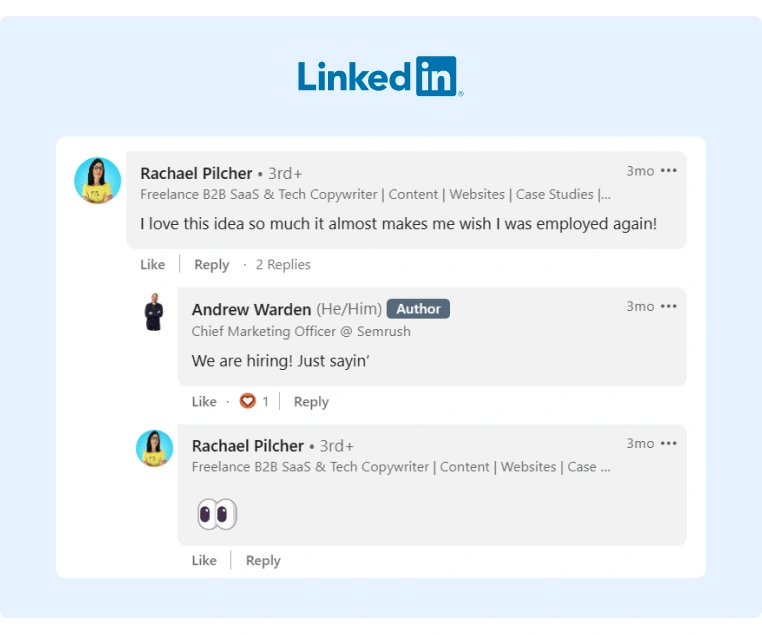
Source: Rachael Pilcher
Key Benefits of Employee Advocacy
Here are just a few reasons why employee advocacy is one of the most effective social media marketing strategies. You can use it to:
Increase Brand Awareness
If you calculate your employees' combined social media connections, you'd probably find that it's the equivalent of hiring several macro-influencers to generate brand awareness.
As an added benefit, you don't have to pay each of your employees to share content.
It's a much more cost-effective marketing strategy than hiring macro-influencers or paying for ads.
Employee advocacy also tends to generate higher-quality brand awareness than other content promotion methods because employees are promoting to a warm audience – their friends.
So, it's much easier to earn trust from their networks than a cold audience.
Sell to a Warm Audience
Most people purchase products and services from people they like and trust. This is one of the big benefits of employee advocacy.
Implementing a formal employee advocacy program that guides your sales reps through building their personal brands and establishing trust with prospects can help increase sales.
This technique is called social selling.
Instead of cold pitching potential prospects, social selling attracts the right prospects to your sales reps through thought leadership content.
Over time, prospects grow to like and trust your sales reps which can translate into more closed deals.
Recruit Top Talent
A-players like to work with:
-
Other A-players.
-
Growing brands solving meaningful problems.
A successful employee advocacy program helps you check off both of these boxes while building your employer branding profile.
A great employee advocacy program helps your employees establish themselves as thought leaders (we'll discuss how they can do this in detail below).
In addition, if employee advocates consistently share exciting company news about groundbreaking achievements, it can help attract top talent.
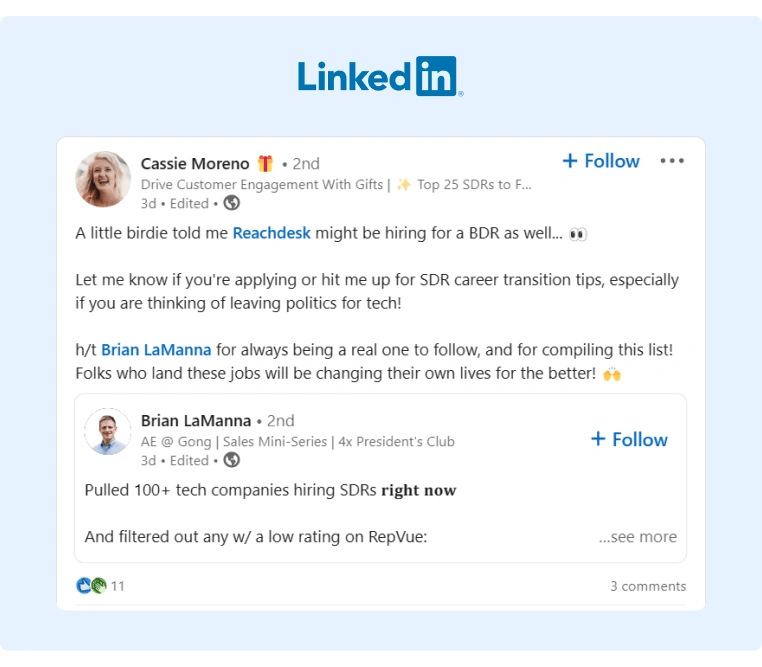
Source: Cassie Moreno
Key Challenges of Employee Advocacy
If employee advocacy is so effective, why don't more brands implement formal employee advocacy strategies?
Unfortunately, most employees quit engaging with company content after a few weeks.
After some analysis, we found that these are a few of the top reasons why employees quit engaging:
- Employees don't know what company content they should share or what they should say.
- Employees are worried they might say something that's against the brand's social media policy.
- Employees don't understand the value of brand advocacy and therefore can't justify the opportunity cost of pausing other high-value tasks to engage on social media.
Fortunately, you can solve these challenges by simply implementing a better workflow process.
Developing an Employee Advocacy Strategy
Most employee advocacy strategies are relatively disorganized. Usually, the marketing team leaders send mass Slack messages or emails generically asking employees to share content.
Here’s how you can implement an employee advocacy strategy that allows you to send personalized engagement activities to employees with simple, yet specific instructions.
The best part? You can do it at scale.
The key is to leverage an employee advocacy platform that automates most of the process for you.
We’re also going to discuss how you can implement an employee advocacy strategy using our employee advocacy tool, GaggleAMP.
Step 1: Select an Engagement Activity
Most employees don't know what content they should share on social media – especially if they typically don't post social media content.
If you have a major launch or company announcement, it might be obvious that employees should share the press release or social post promoting that announcement.
But if there aren't any major announcements, employees might not know what they should share or say.
To solve this, you can provide a specific piece of content for them to engage with and specify the engagement action (like, comment, share, etc.).
Inside GaggleAMP, select an engagement activity (like, comment, share, etc.) for the social media platform of your choice (LinkedIn, Twitter, Facebook, Pinterest, etc.).
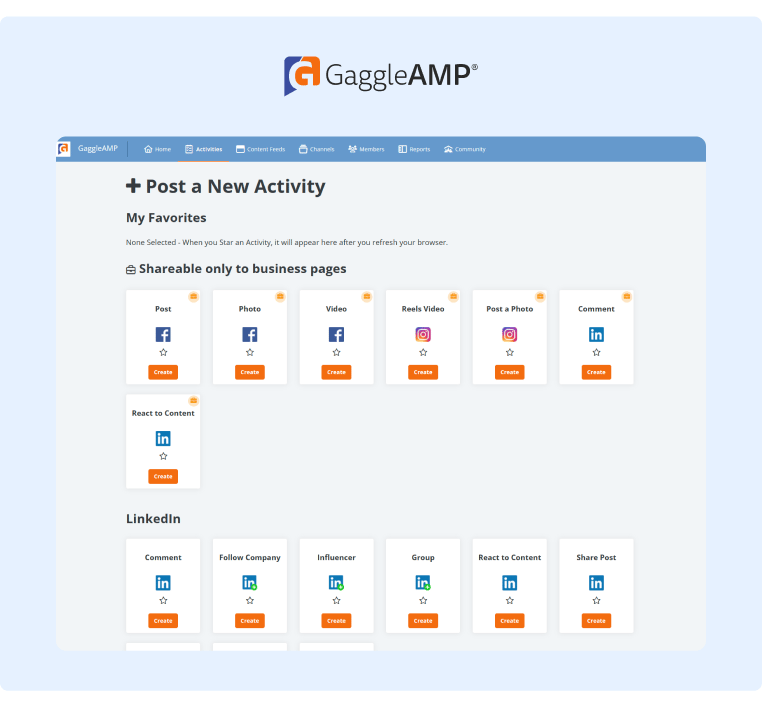
From there, you can fill it out with a specific engagement like a link to the exact post you want them to engage with or guidance on what to say (you can even pre-write text for them).
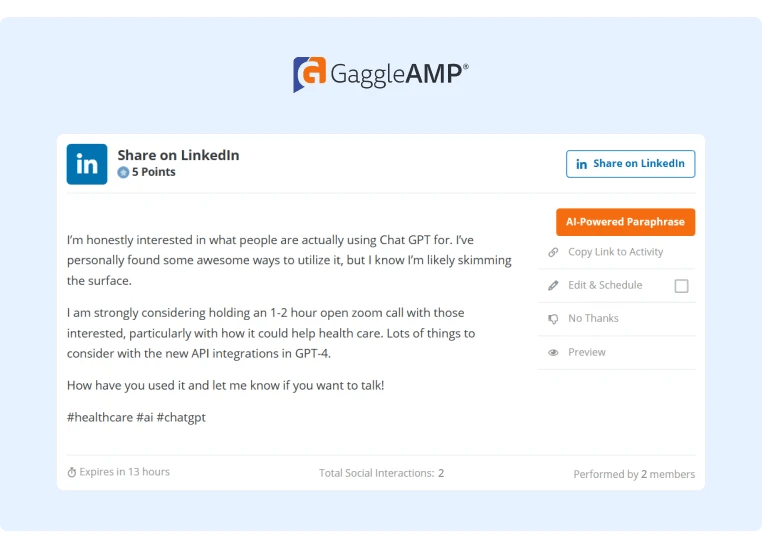
You can also add an expiration date so that it disappears from the employee's activity list after that date. This keeps the employee's to-do list short so they're never overwhelmed.
If you want employees to write their own content, you can use the Question activity, which lets you leave a prompt like:
- What's something you recently learned that prospects would benefit from knowing?
- What's a problem you helped a client solve recently?
- What's your favorite aspect of our company culture?
By providing prompts, you can guide your employees through creating their own content marketing strategies. As a result, they'll grow their personal brands, and you'll have more powerful brand ambassadors to amplify company content.
Step 2: Assign the Engagement Activity
Content that resonates with the marketing team's networks might not resonate with the HR team's networks, so you ideally want to assign different types of content to each team.
GaggleAMP makes this easy as you can assign specific engagement activities to a specific group, like the marketing or sales team.
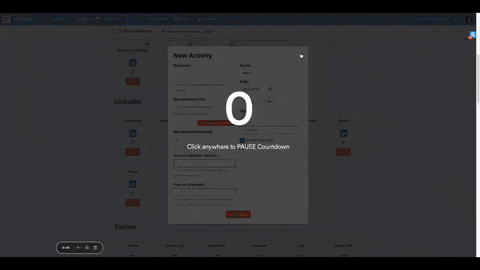
Alternatively, you can assign a specific engagement activity to an individual employee (like a key executive).
This makes it easy to ensure the right employees share the right social media content.
Step 3: Employees Complete the Activity
When you assign employee engagement activities, your team members receive a notification (via email or Slack/Microsoft Teams).
They can click the link in the notification, which takes them to their personal Gaggle dashboard. There, the employee will see an organized list of engagement activities and any instructions you added.
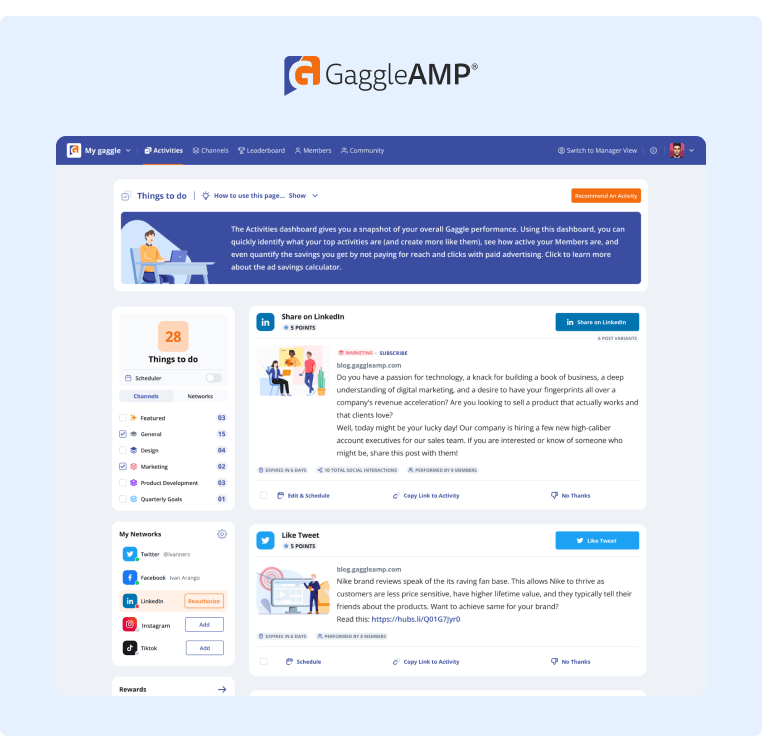
Employees can complete most engagement activities directly inside the dashboard and schedule them to publish at a later date/time.
By scheduling their content in advance, employees can complete their engagement activities in one sitting so that they only have to dedicate a few minutes to employee advocacy once per week.
Above all else, remember that making it easier for employees to engage is key to creating a successful long-term employee advocacy strategy.
Step 4: Track and Measure Employee Advocacy Efforts
Tracking the ROI of any social media strategy is tricky.
Unfortunately, it’s difficult to get buy-in from executives and justify to your teammates why they should spend time participating in your employee advocacy strategy when you don’t have any data to support your claims.
To solve this, we built a robust analytics dashboard into GaggleAMP. It offers insightful metrics like:
- Employee earned media value (EEMV).
- Total unique activities created.
- Number of shares.
- Total reach.
- Number of social interactions.
- Number of clicks.
- Most active members.
You can also see a breakdown of these KPIs across each social media channel to better optimize future campaigns.
Step 5: Reward Employees for Their Efforts
GaggleAMP tracks each employee's engagement activity and ranks them in an internal leaderboard. This additional gamification ignites the competitive spirit in your employees and motivates them to continue engaging.
Another benefit of the leaderboard is that it allows you to recognize and reward your most engaged employees for their efforts. This boosts employee morale, and they'll feel more appreciated and motivated to help.
It also makes it easy to see which employees aren't engaged so that you can reach out and provide additional support.
Choosing an Employee Advocacy Platform
There are plenty of employee advocacy tools available, though we built GaggleAMP because we found that most other solutions didn't fully fit our vision for a frictionless employee engagement experience.
Here are three key reasons why GaggleAMP is highly effective at improving employee engagement while simultaneously decreasing your workload to manage the program.
Key Differentiator #1: Managers Can Send Personalized Engagement Requests at Scale
Plenty of tools let managers send engagement reminders, but GaggleAMP is one of the few tools that allow managers to send specific engagement requests.
This feature is critical to your success because employee advocacy programs are most effective when employees work together to boost critical company content.
If you can't specify which content is most critical and employees share random content, your efforts will be diluted.
Key Differentiator #2: Employees Have a Succinct List of Specific Engagement Activities (It’s Easy for Them)
Employees often quit engaging because they don't know what content they should share, what they should say, or which channel they should engage on.
Even though these may seem like small decisions, it's often enough friction to discourage employees from engaging.
GaggleAMP is unique from other employee advocacy platforms in that it gives each employee their own personal dashboard with a list of detailed engagement activities you created.

Most employee advocacy tools just provide a massive content feed and place the burden on employees to scroll through, choose a post to engage with, figure out how they should engage, and write something thoughtful (that's hopefully within your social media policy).
GaggleAMP also allows employees to schedule activities in advance so that they only have to allocate a few minutes to employee advocacy weekly or biweekly.
Key Differentiator #3: Insightful Reporting That Makes It Easy to Optimize Your Program and Achieve Team Buy-In.
The ROI of employee advocacy is notoriously difficult to track, yet most stakeholders want to see data that shows it's driving the business forward and supporting the company's main goals.
In addition to basic metrics like EEMV, total reach, and total clicks earned from your employee advocacy program, GaggleAMP also offers more detailed metrics across four different reports:
-
Aggregate Report: This shows you the basic metrics like EEMV, total reach, total clicks, as well as a breakdown of the top performing content/channels, and an overview of weekly and monthly performance trends.
-
Content Strategy Report: This allows you to see the activities assigned versus activities completed by social network, activity type, and notification type.
-
Member Engagement Report: You can see a breakdown of the most engaged members, their total potential reach, and general engagement performance.
-
Benchmark Report: Setting goals is tricky if you have no idea how the average employee advocacy program performs. Our benchmark reports provide this data for you. We aggregate data from our customers and will give you a benchmark report of employee advocacy program sizes similar to yours so that you can set goals that are realistic yet challenging.
These reports make it easier to prove the value of brand advocacy to team members and make it easier to create a data-driven growth strategy.
Start Your Employee Advocacy Strategy Today
Employee advocacy is one of the most cost effective strategies to get in front of your target audience through brand advocates they trust (your employees).
However, only a handful of brands effectively leverage employee advocacy, largely because they can’t keep employees engaged.
Whether you’ve tried to implement an employee advocacy strategy in the past or you’re thinking about starting an employee advocacy strategy, consider using GaggleAMP to make it easy for employees to engage.
We’ll even provide one-on-one guidance to help you implement a killer employee advocacy strategy that is sustainable and fun.
To learn more, schedule a demo today!





